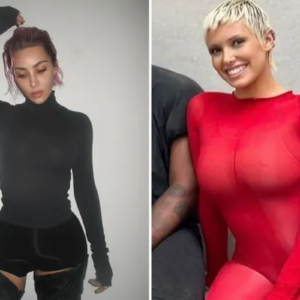ELON Musk has called for the death of diversity, equity and inclusion initiatives as debates over the organizational framework heat up.
He joins the likes of outspoken critic and presidential hopeful Vivek Ramaswamy who feels corporate structures are moving in the wrong direction.

Tech billionaire Elon Musk has joined a growing list of leaders calling for the end of diversity, equity and inclusion. Credit: Reuters

Presidential hopeful Vivek Ramaswamy has created his platform around corporations being open about profit incentives instead of acting as vessels for social causes. Credit: Getty
DEI is an umbrella term that involves efforts to bring more employees from minority groups to companies, government agencies, and other institutions.
This can include special consideration of a candidate’s gender or race during an interview, or diversity trainings that aim to teach workers how to best approach differences in the workplace.
Political moments like Me Too, Black Lives Matter, and Donald Trump’s presidency are all believed to have contributed to an explosion of diversity initiatives in recent years.
A 2023 study found the number of hires for international businesses with the words “diversity” or “inclusion” in the title has more than quadrupled since 2010, The Economist reported.
However, the same study found these initiatives oftentimes fail, or will even backfire completely.
DEI has sparked a massive conversation among business and thought leaders who continue to debate its efficacy.
The latest to throw his name in the ring is tech billionaire Elon Musk, who quipped on X: “DEI must DIE.
“The point was to end discrimination, not replace it with different discrimination.”
He continued: “‘Diversity, Equity and Inclusion’ are propaganda words for racism, sexism and other -isms.
“This is just as morally wrong as any other racism and sexism. Changing the target class doesn’t make it right!”
DEI has been making headlines since fiery debates over the Israel-Hamas conflict pushed the limits of free speech on college campuses.
Critics feel the initiatives allow for so-called “protected” groups to freely spread antisemitic ideals against Jewish people without fear of retribution, due to their identities.
Much of the debate stems from elite universities where some students called for the genocide of Jews during demonstrations.
On Friday, the US House of Representatives voted for the resignation of MIT and Harvard presidents after they determined the leaders failed to effectively respond to the protests.
The vote came days after the University of Pennsylvania President Liz Magill had already chosen to step down from her position.
After the vote, billionaire Harvard alum Bill Ackman claimed that Harvard’s President Claudine Gay only landed her position as the first Black president of the university due to DEI policies.
“Shrinking the pool of candidates based on required race, gender, and/or sexual orientation criteria is not the right approach to identifying the best leaders for our most prestigious universities,” he wrote on X.
He continued: “I don’t think it will be long before we look back on the last few years of free speech suppression and the repeated career-ending accusations of racism for those who questioned the DEI movement.”
Always chiming in the debate is 2024 presidential hopeful Vivek Ramaswamy, who criticized the initiatives in his 2021 book Woke, Inc: Inside Corporate America’s Social Justice Scam.
He feels that corporations should be upfront about their profit motives instead of acting as vessels for social causes.
“I think the diversity equity inclusion agenda has been abused in the name of diversity,” he said this week during a CNN town hall.
“We have, at many of our universities, totally sacrificed diversity of thought.”
He went on to call for the return of a “meritocracy” that would prioritize hiring those most qualified for a position.
“But let it be not a goal, let it just be a byproduct of actually selecting for people who are the best person for the job, and especially in a university setting, diverse viewpoints, as well,” he said.
News
Kim Kardashian shows off her curves and continues to plug controversial $60k Cybertruck – as the Tesla vehicle is plagued with safety problems
Kim Kardashian showed off her toned curves in a skimpy ensemble as she continued to plug her controversial $60k Tesla Cybertruck – amid mounting problems with the vehicle line. The…
Kim Kardashian unveils millennial pink bob in gritty photo shoot… after bleach blonde hair left her looking like Kanye West’s new wife Bianca Censori
Kim Kardashian debuted her new hair in artistic, makeup-free Instagram portraits on Monday. The reality TV personality, 43, showed off her edgy new look after dying her hair a cotton candy pink…
Kim Kardashian the copycat! Reality star looks just like Kanye West’s new wife Bianca Censori with bleached hair, no bra and skimpy ‘apron’ top
Kim Kardashian looked as if she had taken a page from the stylebook of her ex-husband Kanye West’s current wife Bianca Censori during an outing in Los Angeles on Sunday. The 43-year-old reality TV icon…
Khloe Kardashian fans praise the star’s ‘flawless’ figure as she rocks a tiny black bikini while on a yacht
Khloe Kardashian has stunned fans as she rocked a teeny tiny bikini during a yacht ride. In a new Instagram post, Khloe, 39, shared a snapshot of herself in a black…
Kim Kardashian critics say she’s ‘morphing into’ Bianca Censori with ‘fried’ short pink hair and bodysuit in new pics
Fans have accused Kim Kardashian of morphing into her ex-husband Kanye West’s younger wife Bianca Censori in new pics. The Kardashians star recently chopped her hair and dyed…
Jennifer Lopez looks topless as she shows off her incredible body at 54 in bra with a nipple on it for sεxy new video
Jennifer Lopez ‘can’t get enough’ of flashing her bra in her sεxy new music video with rapper Latto. JLo, 54, appeared in one scene wearing a red…
End of content
No more pages to load











